
Thursday, 15th August 2024 at 08:00 - 11:00 GMT+7 | Jakarta

Thursday, 15th August 2024 at 08:00 - 11:00 GMT+7 | Jakarta

ASEAN has witnessed a significant rise the number of Unicorns across various industries, almost doubling from 2021 and reaching a number of 51 this year. Super apps like Grab, Gojek, and Lazada have even become decacorns by passing the $10 billion valuation mark. This has generated a large amount of wealth and employment, positioning ASEAN as a major emerging power on the global tech map.

Delivering Carbon Neutrality for ASEAN Could Unlock Up To US$5.3 Trillion Economic Opportunity ASEAN has set course for a carbon-neutral future, with ASEAN Economic Ministers endorsing a visionary ASEAN Strategy for Carbon Neutrality on 19 August 2023. The Strategy has been designed to complement the ASEAN Member States’ national initiatives in meeting their respective Nationally Determined Contributions under the Paris Agreement.
JAKARTA, 15 August 2024 – ASEAN countries are at varying stages of digital transformation, affecting regional integration and cross-border trade. Businesses, particularly SMEs, can thrive in this evolving landscape by focusing on innovation and fair conduct towards competitors and consumers. However, challenges persist in increasing competitiveness and creating a conducive regulatory environment. To discuss issues and implications, the ASEAN Economic Forum, in collaboration with Deutsche Gesellschaft für Internationale Zusammenarbeit GmbH (GIZ) organised a policy roundtable on “Bridging Borders: Digital Trade and Economic Integration in ASEAN” at the Habibie & Ainun Library on Thursday, 15 August 2024.
The roundtable focused on digital trade, particularly with a view to the upcoming Digital Economy Framework Agreement (DEFA) of ASEAN. DEFA negotiations are expected to be completed by 2025, acknowledging the importance of consolidating commitments to advance the digital economy and e-commerce under a comprehensive digital-only framework.

The distinguished panellists for this roundtable discussion included , Program Director for the GIZ Strengthening Regional Structures for SME Promotion II (ASEAN SME II) project; Sivaram Superamanian, Assistant Director of the Digital Economy Division at The ASEAN Secretariat; Ashish Kapahi, CEO of the ASEAN Economic Forum; and Hilmi Adrianto, Chairman of the Indonesian E-Commerce Association (idEA).
Also on the panel were Andy Tuan-Anh Nguyen, General Director of Dream Incubator SEA; Gayathri Peria, General Manager of ASEAN at SUSE; Jamie Ko, Director of Regional Public Affairs and Policy at Grab Singapore; Raymond Siva, Senior Vice President of Digital Investment at MDEC (Malaysia Digital Economy Corporation); and Hadri Sopri, Head of Trade Policy for Asia-Pacific & Japan at Amazon Web Services (AWS). Harish Pillay, the Deputy Chair of IT Standards Committee, Singapore & Lead of AI Verify Foundation moderated the roundtable discussion. Their diverse expertise provided invaluable insights into the rapidly evolving landscape of regional economic and digital development.
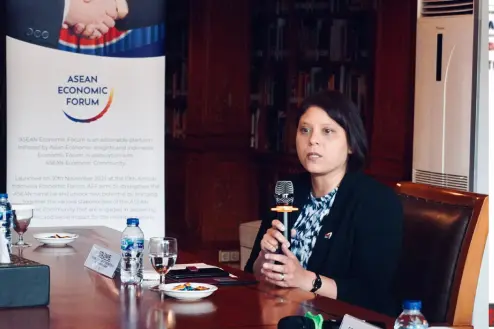
Setting the scene for the discussions, Sita Zimpel, that a lot needs to be done to address digital economy challenges. She used the analogy of 'The Blind Man and the Elephant' to stress the importance of a broad perspective in solving these challenges, hoping that the roundtable will enable experts address the key issues through informed discussions and cooperation.
Her statement was echoed by Andy Tuan-Anh Nguyen, General Director of Dream Incubator SEA, who emphasised arising potentials and prevalent limitations, particularly faced by SMEs.
Building on this, Sivaram Subramanian, Assistant Director of the Digital Economy Division at the ASEAN Secretariat, highlighted DEFA's role in boosting GDP and digital growth in ASEAN. Ashish Kapahi, CEO of ASEAN Economic Forum, further noted that the region's 70 million MSMEs are crucial for this growth, making up 97% of all organisations and providing 85% of employment. However, over 40% of MSMEs are not yet digital or bankable. A digital financial inclusion program could help onboard them, potentially doubling ASEAN's Digital Economy from $1 trillion to $2 trillion by 2030.
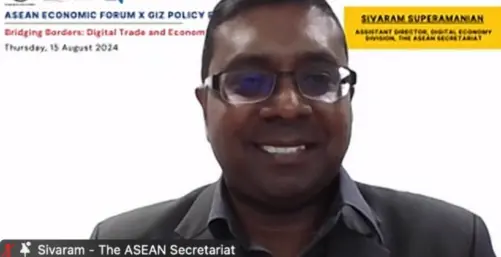
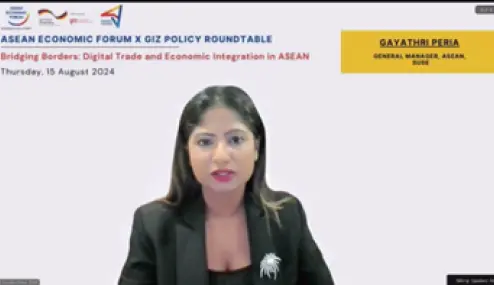
Gayatri Peria, General Manager for ASEAN at SUSE, underlined that open-source solutions are vital for a thriving economy. She noted that collaboration in developing open-source solutions will help businesses adopt the latest technologies more efficiently.
Hadri Sopri, Head of Trade Policy for ASEAN and Japan at AWS, highlighted AWS’s $33 billion investment in ASEAN, including infrastructure in Singapore, Indonesia, Malaysia, and Thailand, to help the region reach $2 trillion. He also emphasised AWS’s commitment to enhancing skills and sustainability through training.
He also mentioned a partnership with a Singaporean agency to create SEA LION, a Large Language Model (LLM) for Southeast Asian languages. DEFA could help drive inclusive AI tools tailored to ASEAN businesses, such as chatbots, code assistants, translators, and meeting summarisers.

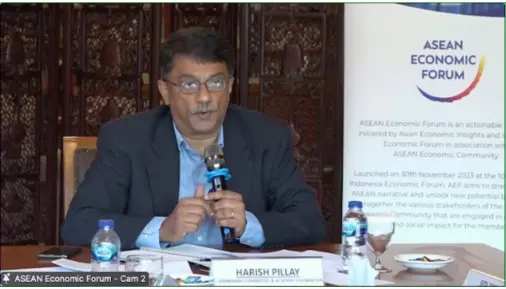
Responding to Hadri, Harish Pillay, Deputy Chair of Singapore's IT Standards Committee and Lead of AI Verify Foundation, highlighted AI's complexities, circling back to the "Blind Man and the Elephant" analogy to stress the need for continuous awareness. Jamie Ko, Director of Regional Public Affairs at Grab Singapore, echoed this by emphasising the importance of zero-trust security architecture and proactive threat detection in ASEAN.
Raymond Siva, Senior VP of Digital Investment at Digital Investment Malaysia Digital Economy Corporation (MDEC), supported Hadri's statement, emphasising the need to upskill talent and companies while upgrading infrastructure. He highlighted that a robust workforce and improved infrastructure are crucial for the digital economy, which aims to contribute 25.5% of GDP by 2025.
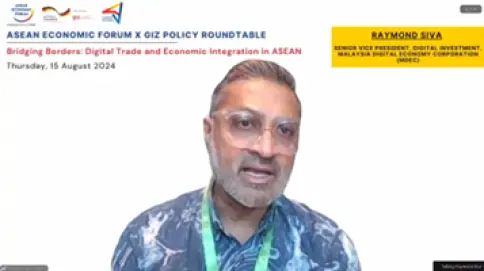
Southeast Asia's digital transformation is key to unlocking economic potential. Empowering SMEs through e-commerce and fostering a strong digital ecosystem is essential, but capacity building, collaboration, and digital skills development, especially in AI, need to be prioritized.
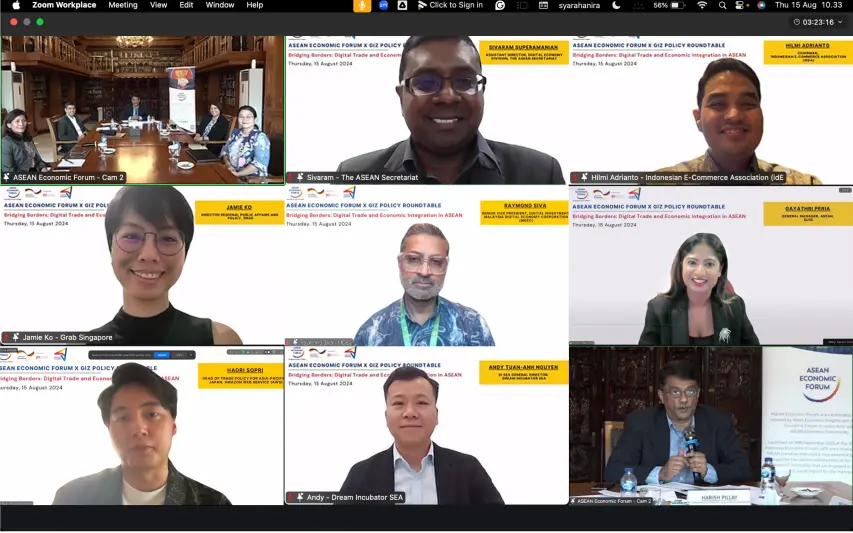
With their vast experience and subject matter expertise, the panelists exchanged insights. They engaged in comprehensive discussions, focusing on the key areas that need to be addressed when crafting policies to ensure robust digital growth across ASEAN member states. The following key action items were identified:
By speedily implementing these actionable strategies and creating a well-defined roadmap for digital transformation, ASEAN can fast-track its digital agenda and become digitally inclusive and prosperous, stimulating entrepreneurship and accelerating digital adoption across the entire region.
The ASEAN Economic Forum was officially announced on November 30, 2023, at The Habibie & Ainun Library Jakarta during the 10th Indonesia Economic Forum. ASEAN Economic Forum is an independent and autonomous organization that serves as a crucial platform to bring together stakeholders that includes researchers, policy makers, industry representatives, community representatives and government, business, civil society, academia, and youth. By facilitating the platform for discussions, AEF fosters engagement between the stakeholders to address policy issues, establish innovative insights, and promote sustainable economic development as a purpose to stabilize the fundamental financial markets.
Operating in over 120 countries worldwide, the Deutsche Gesellschaft für Internationale Zusammenarbeit (GIZ) is a public-benefit federal enterprise that supports and plays a crucial role in supporting the German Government achieve its goals in international cooperation for sustainable development. Since 2009, GIZ has been working with ASEAN at its headquarters, the ASEAN Secretariat, its specialised centers, relevant sectoral bodies, and Member States. For more information, please visit the page.